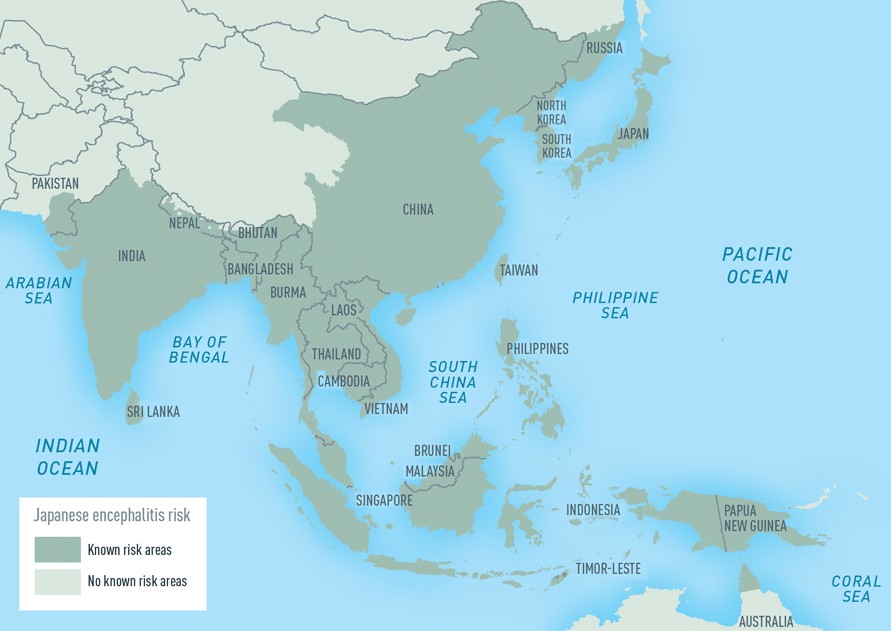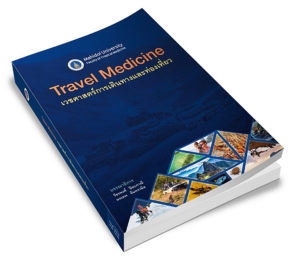This is another most common question in our Travel Clinic. People who ask this question usually have good knowledge about Japanese encephalitis (JE) and its risk. Many of them have already consulted their travel doctor and many of them have done a good research on Internet. Despite that, many of them still doubt and have some questions like; “Do I really need a JE vaccine?” or “Should I get a JE shot?”. In fact, this is not an easy question, especially consider the very high cost of JE vaccine. There are many things to consider and discuss.
Before we go into detail and try to answer the above question; let’s review some basic knowledge of JE.
What is Japanese encephalitis?
1. Japanese encephalitis is a mosquito borne disease which mainly confine in Asia including some part of East Asia, South Asia and Southeast Asia; as shown in this map from the CDC Yellow book 2018.
2. Life cycle of JE virus is associated with pig which is an amplifying host. Human get an infection by the bite of Culex mosquitoes. And they are night time bitter. Transmission occur mainly in the rural area especially in area where flooding irrigation is practiced or near the paddy field.
3. Most JE infections in human will lead to no symptom at all. Small percentage of infection will lead to symptoms; severity will be vary from very mild to very severe. Some may have fever with or without rash, headache, and can spontaneously recover. Only a minority of case will turn into encephalitis or brain inflammation. Unfortunately, people who do develop encephalitis with JE will be severe; around 25% will die and many of survivors will have permanent neurological deficit. There is no specific treatment for this disease i.e. there is no effective antiviral treatment for JE virus. Only supportive treatment is provided.
4. In Thailand and many others in Asia including China, Malaysia; we give JE vaccine to everyone in their childhood. So the total number of JE cases in our country is very low now. But remember that even we have zero human case, it does not mean that there is no risk. Since we have pigs and mosquitoes, pigs are reservoir host and mosquito can bite pig and then bite human. So it is unlikely that we can eradicate this disease.
5. In the past we use inactivated mouse-brain derived vaccine which require 3 shots in a series. Its efficacy is high, but its potential severe side-effect is possible, so in the past, we do not give to the low risk travelers. And now we do not use this type of vaccine anymore in our clinic.
6. Nowadays, there are two new excellent types of JE vaccines. One is an inactivated vero-cell JE vaccine (Ixiaro®) which is licensed in the USA, Australia and in some European countries. It is very safe and effective. The other kind of JE vaccine is lived SA-14-14-2 vaccine (CD JEVAX, Imojev), which is commonly used in Asia including in our clinic. Both CD JEvax and Imojev are very safe and very effective even after single shot. The side effect is generally low and usually mild. Severe side effect is very rare. So we are more comfortable to use in travelers.
What is the risk of Japanese Encephalitis among travelers?
There is not possible to estimate the actual risk for each individual. We just know that travelers who travel for a longer period of time, in the rural agriculture area, have outdoor activity especially in the night time have more chance to get Japanese encephalitis. But generally speaking the risk for traveler to develop JE is very low. For easy understanding, from now, the risk of JE refer to only severe encephalitis symptoms. Not include mild or asymptomatic JE infection. So the risk for travelers to actually have brain inflammation from JE virus is low and How low??? 1%? 1 in 1,000? or 1 in 10,000? or even lower than that ?
There are several researches aim to answer that questions. Statistically, we believe that the risk of Japanese encephalitis is likely to be somewhere between 1 per 1,000,000 to 1 per 30,000. What do you think of that numbers? In fact, no one know the actual risk for each individual. But to be easy to discuss and understand, let’s say if the risk is 1:100,000, what do you think? This number means that among 100,000 travelers travel to Asia only 1 will develop JE. Is it low or is it high? Someone could say that risk of 1:100,000 is low. Some can say that risk is high, especially when they consider that “1” who unlucky enough to get JE will die, and there is no treatment. So you can see, everyone look at the same number different. In Travel Medicine, this is called Risk Perception.
Ok let’s say if the risk is 1:100,000 should we get the vaccine?
This is also another difficult question and it is also related to your risk perception. Some may think this number is low enough to neglect and they are completely comfortable with that. While some travelers still worry, because the number 1:100,000 is still high and they do not accept any risk. You see, each traveler can have different perspective whether we could or how low is the risk that we can accept. Here come another term in Travel Medicine called Risk acceptability or Risk tolerance. So this is why formal discussion with a qualified travel medicine doctor is needed. The doctor will estimate the risk of the disease, the perception of travelers, assess the cost-risk-benefit of vaccine and other preventive measure then have a two way communication with travelers. This is the process of “risk assessment, risk communication and risk management”.
What are experts recommendation about JE vaccine?
Here is the World Health Organization (WHO) statement
“The risk of Japanese encephalitis is very low for most travellers to Asia, particularly for short-term visitors to urban areas. However, the risk varies according to season, destination, duration of travel and activities.”
Vaccination is recommended for travellers with extensive outdoor exposure (such as camping and hiking) during the transmission season, particularly in endemic countries or areas where farming involves irrigation by flooding.
Prevention is by avoiding mosquito bites and by vaccination”
(From WHO Green Book, International Travel and Health 2017)
Here is the current US CDC recommendation about the use of JE vaccine in travelers. They divide into 2 categories;
1 JE vaccine is recommended for travelers who plan to spend ≥1 month in endemic areas during the JE virus transmission season. This includes long-term travelers, recurrent travelers, or expatriates who will be based in urban areas but are likely to visit endemic rural or agricultural areas during a high-risk period of JE virus transmission.
2 JE vaccine should be considered for the following persons:
2.1 Short-term (<1 month) travelers to endemic areas during the JE virus transmission season, if they plan to travel outside an urban area and their activities will increase the risk of JE virus exposure. Examples of higher-risk activities or itineraries include 1) spending substantial time outdoors in rural or agricultural areas, especially during the evening or night; 2) participating in extensive outdoor activities (such as camping, hiking, trekking, biking, fishing, hunting, or farming); and 3) staying in accommodations without air conditioning, screens, or bed nets.
2.2 Travelers to an area with an ongoing JE outbreak.
2.3 Travelers to endemic areas who are uncertain of specific destinations, activities, or duration of travel.
JE vaccine is not recommended for short-term travelers whose visit will be restricted to urban areas or times outside of a well-defined JEV transmission season.
(From the US CDC Yellow Book. International Health 2018)
What is our recommendation regarding JE vaccine?
Firstly, our doctor will assess the risk for each travelers. We will ask about the age, sex, nationality, duration of stay, season of travel, previous experience in Asia, planned activity, etc. We will use this information to estimate the risk and will inform and discuss with the travelers. Good two-way communication is required in order to give a good and sound recommendation.
For example: In very low risk travelers, such as a businessman who will attend 3-days meeting in Bangkok, we will not recommend JE vaccine. On the other hand, we will strongly recommend JE vaccine in backpackers who plan to travel in Southeast Asia for 2 months and will spent most of the time in rural area.
Generally speaking, we will recommend JE vaccine for travelers in Southeast Asia who will stay here more than 2-3 wks, especially who will travel in rural area and may expose with mosquito. We do not pay special concern to seasonality, since transmission of JE in Southeast Asia could occur all year round.
Which JE vaccine should I get?
Please read this article: Type, Safety and Availability of JE vaccines in Thailand



super helpful information, much appreciated! I’m going to SE Asia for 3 weeks but will be bicycling all day. I think it’s worth it for me, but it’s nice to know the rationale for/against needing the vaccine. thank you!
Asking questions are in fact pleasant thing if you are not understanding anything fully, except this
piece of writing provides pleasant understanding even.- calator.tel
@Michael Kelley – I had read in https://www.expatden.com/thailand/vaccinations-for-thailand/ that you can receive a Japanese Encephalitis vaccine in Thailand for $16 plus the consult fee of $3.15 in a Thai clinic. Hope this helps!
Good information, thank you.
Compared to the other articles I read, this goes into more details and is more useful for breaking down when/why I might choose to either get vaccinated for JE or not. Thanks for the explanations and being willing to discuss what “acceptable” risk might look like to different people!
How much can I expect to pay in Thailand for the Japanese Encephalitis vaccine?
You can see the price of vaccine here: https://www.thaitravelclinic.com/cost.html
For some reason, your article makes sense to me. Maybe I just agree with your thoughts. It helps that you write interesting content.
This is a brilliant assortment of information and facts you described in this article, I honestly think we could count on a lot more very soon.